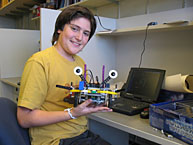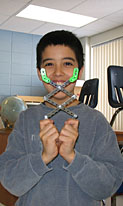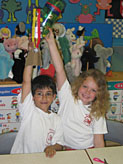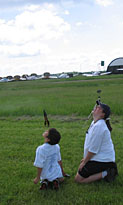Let's talk science!
Remember when you were in high school biology class and the teacher announced you'd be dissecting frogs? There yours lay, pinned down on the tray in front of you, in a drug-induced sleep, slimy and helpless. Were you squeamish? Excited? Curious? Did you feel bad or think it was wrong?

A student shows off a robot he designed during a week spent in the lab of Let's Talk Science volunteer Isabel Deslauriers, PhD candidate, Telecommunication and Signal Processing group in the electrical and computer engineering department
Isabel Deslauriers
At Marymount Academy, upon the teacher's request, graduate students Michael Jain and Frédéric Laporte from McGill's Department of Anatomy and Cell Biology went to talk to students about the ethics of experimenting on animals.
This was just one of the many activities organized by McGill's Let's Talk Science program. "I expected a lot of knee-jerk reactions," recalled Jain. "But most students had very nuanced views on the issue. At the end, they were much more excited about doing the dissection because I had said to them, 'This frog is giving up its life for you, so you had better learn as much as you can from it!'"

A student from Children's World Academy with a tool he designed for a NASA competition that asked kids to design a Mars Exploration Tool
Isabel Deslauriers
Let's Talk Science (LTS) is a national, non-profit volunteer organization that aims to promote science education. The McGill branch was founded in 1998 by the late Gerald Price, under the wing of the Department of Experimental Medicine. "Our goal is to promote science among the general population so that people become more interested in science and more aware of what scientists do," explained Karen Lee, one of the program's coordinators. "We want to make scientists more approachable."
Dr. Hugh Bennett, chair of the Department of Experimental Medicine, stressed the importance of this type of exposure to science. "I firmly believe we need to reach out and improve the knowledge of science at the most basic level so that people can make better informed decisions about their lives."
Three main activities
Classroom partnerships, science fair project mentoring, and science fair judging are the three main activities of LTS McGill. When teachers contact LTS about a particular subject, it's Lee's job to find a student volunteer with the appropriate expertise. Last year, McGill graduate students gave 31 classroom presentations and workshops, on topics ranging from DNA fingerprinting to the different phases of gases (demonstrated by using liquid nitrogen to make ice cream!).

Two second grade students holding up rockets they built with pop bottles
Isabel Deslauriers
Chad Boulay, a master's student in neuroscience, talked to students at Trafalgar High School about how drugs affect the brain. "They had tons of questions. Even in grade eight, they're very much exposed to drugs." Instead of using scare tactics, he just gave them the facts. "Giving them the power to make their own decisions is very rewarding," he said.
Boulay and Jain have also participated in science fair project mentoring. Boulay provided guidance to a student who was building a colour detector, while Jain helped two girls with their experiments on detecting genetically modified organisms in food.
Many volunteers begin by judging a science fair. In 2003–2004, McGill graduate students were judged 10 school science fairs as well as the Bell Regional Science Fair. "The teachers appreciate it because it's often hard to find quality judges. Some parents may have the expertise, but often they're too lenient. Graduate students are tougher!" laughed Lee.
At the second annual McGill LTS Teachers-Volunteers Gather-ing held on May 19, teachers said their students really enjoy having graduate students come in to work with them. "They really do look up to you," one teacher told the volunteers.
Robotics project
In the last year, the program has doubled to nearly 100 volunteers, reaching out to 1,750 elementary and high school students in the Montreal region. So far there's been a heavy focus on health and life sciences. This year, LTS wants to recruit more volunteers from engineering and the physical sciences, and to promote these subjects among school teachers.

Isabel Deslauriers and a student lauch a model rocket at Space Day
Naveen Mysore
Under the special robotics project, for example, LTS McGill aims to purchase LEGO robot kits and train volunteers to give workshops in elementary and high school classrooms. Other plans include creating a catalogue of presentations to give teachers a better idea of possibilities, and organizing lab tours so that teachers can bring their students to visit McGill's various labs.
"Not all kids will become scientists," notes Jain, "but it's important to get them thinking in a scientific way." How else can you think critically and make judgments about the complex world around us, he argued. For those who are interested in science, the program makes it all seem a bit more possible. "The kids see that it's not just a bunch of crazy, super-smart people running around in lab coats doing these things; it's that goofy guy at the front of the room who talks about their favourite TV shows."
For more infomation, see www.medicine.mcgill.ca/expmed/LTSM/. To learn about becoming an LTS volunteer, contact Karen Lee at chingyin.lee@mail.mcgill.ca or write to ltscience@ece.mcgill.ca.
